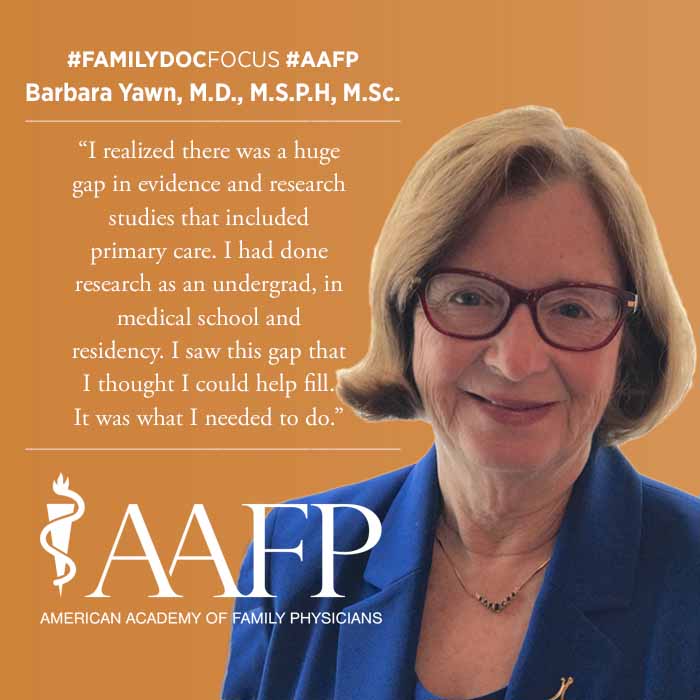Building a Foundation of Evidence-based Research
November 04, 2019 12:21 pm David Mitchell – Barbara Yawn, M.D., M.S.P.H., M.Sc., was a partner in a rural family medicine practice for more than a decade, delivering more than 1,000 babies, taking call in the hospital, seeing patients in the ICU and assisting with surgeries, in addition to treating patients in clinic.
Yet despite that broad scope, something was missing.
"I realized there was a huge gap in evidence and research studies that included primary care," she said. "I had done research as an undergrad, in medical school and residency. I saw this gap that I thought I could help fill. It was what I needed to do."
Yawn went back to school in her 40s, earning a Master of Science degree in clinical research design and statistical analysis from the University of Michigan in 1991. Since then, the research gap Yawn identified has gotten significantly smaller because of her prolific work. She has been published in peer-reviewed journals more than 400 times, presented CME and posters related to her work at national and international events more than 100 times, and written or contributed to more than a dozen books.
Yawn started a primary care research department at the Olmsted Medical Center in Rochester, Minn., in 1990 and served as its director for the next 25 years. At its inception, it was one of only a few primary care research departments based in a private group practice in the nation.
Recognizing Yawn's expertise, the AAFP selected her to serve on its Committee on Research in 1995-96, followed by six years on the Academy's Commission on Science, including two years as chair. She also served on the AAFP's Task Force on Primary Care Research.
"My work with the academies -- state and national -- (was) really important because it gave me opportunities to be involved with things at a different level," she said. "My work with the AAFP helped shape my career. Being on a commission is a lot of work, but you get a lot back."
Starting in 2004, Yawn served as the AAFP's representative on an expert review panel for the National Heart, Lung and Blood Institute's asthma guidelines. When released in 2007, the guidelines document was one of the first to highlight the strength of its recommendations based on evidence. That practice has since become standard.
Yawn said she was happy to be "an instrument" as the AAFP put increased emphasis on the need for evidence-based recommendations.
"People might think it's always been that way, but it wasn't when I started," she said. "It used to be that if you got four experts in a room, that was it. It was all about 'expert opinion.' Using and reporting an evidence base was an exciting change."
Yawn's contribution to the asthma guidelines led the NHLBI to bring her back for additional expert panels, including an opportunity to co-chair a guideline panel on sickle cell disease.
"I think they had me on speed dial," said Yawn, who said her experiences helped facilitate better collaboration between the AAFP and NHLBI.
Working on the asthma guidelines sparked Yawn's "intense interest" in respiratory illness and research. After "retiring in theory" from Olmsted in 2015, Yawn became the chief science officer for the COPD Foundation and now is that organization's principle investigator in multiple ongoing studies. She also is consulting on studies related to asthma and COPD for Harvard and Cornell, respectively.
On Nov. 8, Yawn will participate (along with a pulmonologist and patients) in a webinar hosted by the AAFP and the American Thoracic Society that will address treatment, management and care coordination for patients with COPD.
"A lot of people, as COPD gets worse, will need to collaborate with pulmonologists, cardiologists, patients and families," she said. "People talk about it, but we're not doing it as well as we would like."
The webinar also will address different COPD phenotypes, she said.
"Not everyone's COPD looks alike," she said. "How do we use that to guide care? For example, some patients have frequent exacerbations while others have chronic bronchitis or eosinophilia. How do we factor that into our selection of treatment?"
